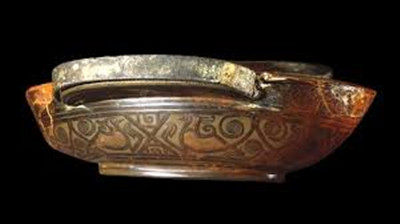Throughout history, as any anthropologist will tell you, the simplest way to bind people to you has been to give them a special gift-a present that only you can give, and only they are worthy to receive; a present like the object in this programme.
纵观历史,每个人类学家都会告诉你,最简单的笼络人心的方式便 是赠送特别的礼物。一件只有你能送出,也只有对方才配拥有的礼物, 如本文中的这一件。
In the last few programmes I've been considering how the leaders of vast kingdoms and empires built and retained their supremacy, whether by borrowing the image of Alexander the Great, preaching the ideals of the Buddha in India, or buying off the priesthood in Egypt.
我一直在思考那些伟大帝国的统治者如何巩固自己的权威,无论是借用亚历山大大帝的头像、宣扬佛教理念还是收买埃及祭司。
In this programme, we are in Han Dynasty China, two thousand years ago, exploring the giving of Imperial gifts-an activity which straddles the murky boundary between diplomacy and bribery.
而在两千年前的中国汉代,馈赠礼物是帝王建立影响力的一个主要方式,这是一种介于外交与贿赂之间的模糊地带的行为。
Our cup comes from a turbulent period in the Han Dynasty, when at the centre the emperor was under severe threat and, at the edges of the Empire, he was struggling to keep control.
漆杯制作之时,汉朝正处于内忧外患之中。在帝国的中心,君王正面临严重威胁,同时又要竭力稳固边疆。
The Han had extended Chinese power as far south as Vietnam, west to the steppes of Central Asia and north to Korea, and in each of these places they had set up military colonies.
汉代的统治疆土南至越南,西至中亚草原,北达朝鲜。每一个边塞都有驻军。
As Han commerce and settlements grew in these outposts, so their governors gained in power, and there was always a risk that they might turn into independent fiefdoms-what the Chinese now call 'splittism' was a worry even then.
随着边塞贸易逐渐繁荣,人口增加,当地将领的势力膨胀,有拥兵自重谋取独立的风险。后世中国所谓的分裂主义,当时就已令统治者烦心。
The governors' loyalty to the Emperor needed to be secured. And one of the ways the emperor kept them on-side was to give them gifts that carried huge Imperial prestige.
皇帝需要将领的绝对忠心,达到这一目的方法之一便是赠送他们能体现皇帝烕仪的物品。
In the British Museum we have an exquisite lacquer wine cup, which was probably given by the Han emperor to one of his military commanders in North Korea around the year 4 AD.
大英博物馆中保存的这只精美的漆酒杯,很可能就是公元四年左右汉朝皇帝赠送给他在朝鲜的一位将军的礼品。



